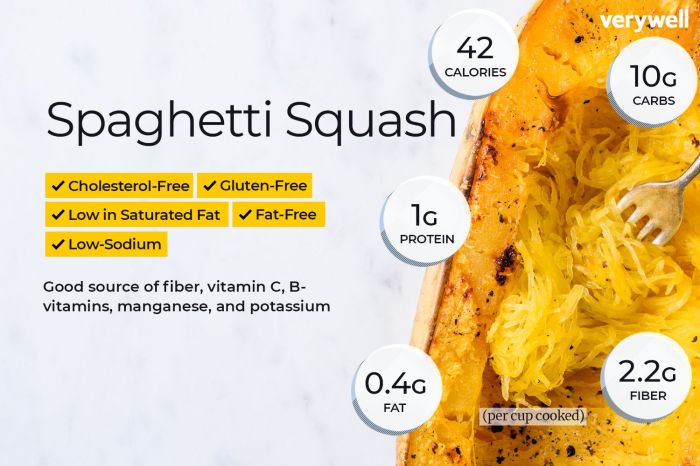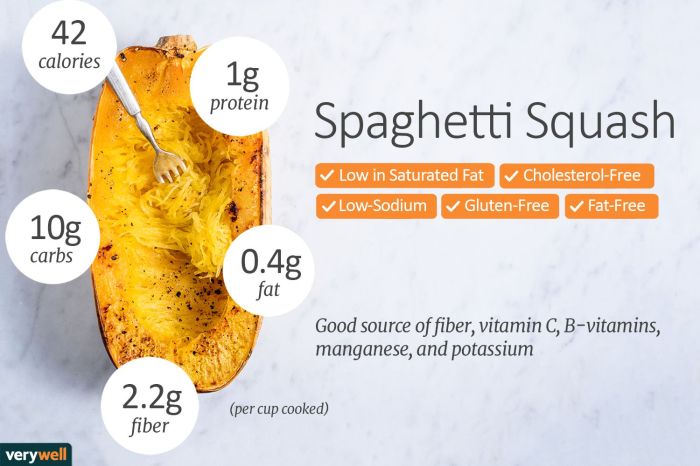Culinary Uses of Spaghetti Squash

Nutrition facts spaghetti squash – Spaghetti squash, with its unique texture and mild flavor, offers a versatile canvas for culinary creativity. Its stringy flesh, reminiscent of pasta, makes it a healthy and delicious alternative in numerous dishes. This section explores various ways to prepare and utilize this nutritious winter squash.
Spaghetti squash offers a surprisingly low-calorie, high-fiber alternative to traditional pasta. Its nutritional profile is quite different from, say, the rich fats found in smoke salmon nutrition facts , which are also worth considering for a balanced diet. However, returning to spaghetti squash, its vitamin and mineral content makes it a healthy addition to various dishes, contributing significantly to a well-rounded nutritional intake.
Diverse Recipes Featuring Spaghetti Squash
Spaghetti squash’s adaptability lends itself to a wide range of culinary applications. Its mild flavor allows it to complement bold seasonings and diverse ingredients, making it a welcome addition to both simple and complex recipes.
- Spaghetti Squash with Marinara and Meatballs: A classic Italian-inspired dish where the squash replaces traditional pasta, creating a lighter, healthier meal.
- Roasted Spaghetti Squash with Sausage and Peppers: A hearty and flavorful dish perfect for a weeknight dinner. The sweetness of the squash complements the savory sausage and peppers.
- Spaghetti Squash Carbonara: A creamy and decadent dish that utilizes the squash as a base for a traditional carbonara sauce with eggs, cheese, and pancetta.
- Curried Spaghetti Squash with Chickpeas and Coconut Milk: A vibrant and flavorful vegetarian dish that showcases the squash’s ability to absorb rich spices.
- Spaghetti Squash “Pad Thai”: A unique twist on a classic, using the squash as a noodle substitute in a peanut-based sauce with vegetables and tofu or shrimp.
Methods for Preparing Spaghetti Squash
Proper preparation is key to unlocking the best flavor and texture from spaghetti squash. Different cooking methods yield slightly different results, allowing for culinary flexibility.
- Roasting: Roasting brings out the natural sweetness of the squash. Halve the squash, scoop out the seeds, and roast cut-side down at 400°F (200°C) for 40-60 minutes, or until tender.
- Steaming: Steaming is a gentler method that preserves more nutrients. Place the halved and seeded squash in a steamer basket over boiling water for 30-45 minutes, or until tender.
- Microwaving: Microwaving offers the quickest cooking time. Pierce the whole squash several times with a fork, then microwave on high for 8-12 minutes, flipping halfway through. Let it rest for a few minutes before scooping out the flesh.
Enhancing the Flavor of Spaghetti Squash
While spaghetti squash possesses a naturally mild flavor, it readily absorbs other tastes, making it an excellent vehicle for creative seasoning.
Experiment with various herbs, spices, and additions to elevate the flavor profile. Consider adding:
- Herbs: Fresh herbs like basil, oregano, thyme, and rosemary complement the squash beautifully.
- Spices: Garlic powder, onion powder, paprika, cumin, and curry powder add depth and complexity.
- Cheese: Parmesan, mozzarella, and ricotta cheese enhance the richness and creaminess of dishes.
- Nuts and Seeds: Toasted nuts and seeds, such as pecans, walnuts, or pumpkin seeds, provide textural contrast and added flavor.
Pairing spaghetti squash with other foods also contributes to its overall taste experience. It works well with meats such as sausage, chicken, and beef, as well as with various vegetables and cheeses.
Different Ways to Prepare Spaghetti Squash, Nutrition facts spaghetti squash
The table below illustrates the versatility of spaghetti squash across different culinary applications.
| Preparation Method | Style | Example | Flavor Profile |
|---|---|---|---|
| Roasted | Main Course | Spaghetti Squash with Marinara and Meatballs | Savory, Italian-inspired |
| Steamed | Side Dish | Steamed Spaghetti Squash with Lemon and Herbs | Light, refreshing |
| Microwaved | Soup | Creamy Spaghetti Squash Soup | Rich, comforting |
| Roasted | Pasta Substitute | Spaghetti Squash Carbonara | Creamy, decadent |
Spaghetti Squash in Different Diets: Nutrition Facts Spaghetti Squash

Spaghetti squash is a versatile vegetable that fits well into many different dietary approaches due to its low calorie count, high fiber content, and unique texture. Its adaptability makes it a valuable addition to various meal plans, offering both nutritional benefits and culinary flexibility. This section will explore its suitability for several popular dietary patterns.
Spaghetti Squash and Vegan/Vegetarian Diets
Spaghetti squash is naturally vegan and vegetarian-friendly. It contains no animal products and can easily be incorporated into a wide range of plant-based recipes. Its mild flavor allows it to complement various spices and sauces, making it a suitable base for many vegetarian dishes, from simple pasta substitutes to more elaborate casseroles. For example, it can be roasted with herbs and spices, then topped with a vegan pesto or used as a base for a hearty lentil “meat” sauce.
Spaghetti Squash and Ketogenic/Low-Carbohydrate Diets
While spaghetti squash contains carbohydrates, its lower net carb count compared to traditional pasta makes it a suitable option for ketogenic and low-carbohydrate diets. Its fiber content helps to slow down the absorption of sugars, resulting in a more moderate blood sugar response. However, portion control is essential. Individuals following these diets should carefully track their carbohydrate intake and adjust their spaghetti squash consumption accordingly.
A serving size of approximately 1 cup of cooked spaghetti squash provides approximately 10 grams of net carbohydrates.
Spaghetti Squash and Diabetic Meal Plans
The high fiber content and relatively low glycemic index of spaghetti squash make it a beneficial addition to diabetic meal plans. Fiber slows the absorption of sugars, preventing rapid spikes in blood glucose levels. However, as with ketogenic diets, portion control remains crucial. Individuals with diabetes should consult with their healthcare provider or a registered dietitian to determine appropriate serving sizes and incorporate spaghetti squash into their personalized meal plan effectively.
Spaghetti Squash and Medication/Supplement Interactions
There are no known significant interactions between spaghetti squash and common medications or supplements. However, as with any food, excessive consumption could potentially impact individuals with specific medical conditions or those taking particular medications. If you have concerns, consult your doctor or a registered dietitian before making significant dietary changes.
Spaghetti Squash Suitability Across Diets
| Diet | Suitability | Nutritional Considerations | Notes |
|---|---|---|---|
| Vegan | Excellent | Good source of fiber, vitamins, and minerals. | Naturally vegan, versatile in plant-based recipes. |
| Vegetarian | Excellent | Good source of fiber, vitamins, and minerals. | Naturally vegetarian, easily incorporated into various dishes. |
| Ketogenic | Moderate | Contains carbohydrates, portion control is crucial. Consider net carbs. | Use in moderation, monitor carbohydrate intake. |
| Low-Carbohydrate | Moderate | Contains carbohydrates, portion control is crucial. Consider net carbs. | Use in moderation, monitor carbohydrate intake. |
| Diabetic | Good | High fiber content, relatively low glycemic index. Portion control is essential. | Consult with a healthcare professional to determine appropriate serving sizes. |
General Inquiries
Can I freeze spaghetti squash?
Yes, cooked spaghetti squash freezes well. Allow it to cool completely before storing in airtight containers or freezer bags for up to three months.
Is spaghetti squash good for diabetics?
Yes, its low glycemic index makes it a suitable option for managing blood sugar levels. However, portion control is still important.
How long does it take to cook spaghetti squash?
Roasting typically takes 45-60 minutes, while microwaving can be quicker, depending on the size and wattage.
Can I eat spaghetti squash raw?
While technically edible raw, it’s generally recommended to cook spaghetti squash to improve its texture and digestibility.
What are some substitutes for spaghetti squash?
Other low-carb alternatives include zucchini noodles, shirataki noodles, or hearts of palm.
